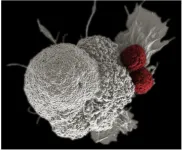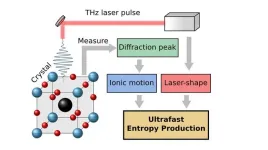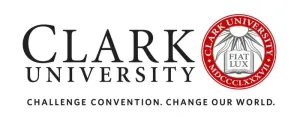(Press-News.org) A Medicare policy requiring primary care providers (PCPs) to share in the decision-making with patients on whether to proceed with lung cancer screening is fraught with confusion and lack of evidence-based information, and may actually be undermining the purpose for which it was created, Mount Sinai researchers say.
In their study, published in Annals of Family Medicine, the team reported that the policy, enacted nearly 10 years ago to encourage the use of lung cancer screening, is in urgent need of new research, protocols, and guidelines to enable physicians to make more confident and informed decisions around which patients are suitable candidates for lung cancer testing.
The policy of shared decision-making was intended to take into account the patient’s full health history. It was prompted by the fact that smokers have an increased risk of not just lung cancer but complex comorbidities—including cardiovascular or cerebrovascular disease and chronic obstructive pulmonary disease—from their tobacco exposure. The policy required counseling on the importance of adherence to annual lung cancer screening, impact of comorbidities and ability or willingness to undergo diagnosis and treatment, but did not address the increasing prevalence of comorbidities, or give any guidance on how to assess the impact of comorbidities on screening, diagnosis, and treatment. That, the researchers said, is part of the problem.
“The policy was added in 2015 for a well-intentioned reason, but unfortunately it’s caused a great deal of confusion over patient eligibility and may contribute to ambivalence among primary care physicians when it comes to recommending lung cancer screening to patients with complex comorbidities,” says lead author Minal Kale, MD, MPH, Associate Professor of Medicine (General Internal Medicine) at the Icahn School of Medicine at Mount Sinai. “Our study found that primary care physicians’ approach reflects a dearth of evidence-based guidance for lung cancer screening shared decision-making in patients with complex comorbidities.”
The goal of the Mount Sinai study was to better understand how primary care physicians factor comorbidities into their evaluation of the risks and benefits of lung cancer screening, and into their shared decision-making conversations with patients. Researchers conducted interviews via videoconference with 15 PCPs from internal medicine practices affiliated with the Mount Sinai Health System. From these 45-minute sessions they learned that PCPs are predisposed to make subjective clinical judgments about whether a patent is a good candidate for lung cancer screening before approaching the patient, rather than basing that determination on a shared discussion.
“Patients perceived as likely to adhere to treatment recommendations and as having a high quality of life were more likely to be advised to undertake lung cancer screening, as opposed to those who had previously expressed frustration or dissatisfaction with their state of health and well-being,” notes Juan Wisnivesky, MD, DrPH, Drs. Richard and Mortimer Bader Professor of Medicine and Chief of the Division of Internal Medicine at Icahn Mount Sinai, and co-author of the study. “Other patient characteristics shown by the study to influence physician judgments include life expectancy, presence of a support system, and expectations of and attitudes toward medical care.”
To counter that selection bias, the study’s authors called for continued research to determine the impact of comorbidities on lung cancer screening risks and benefits, as well as its clinical applications. “Uncertainty by primary care physicians in referring patients for lung cancer screening likely reflects their confusion about its benefits due to complicated recommendations,” explains Dr. Kale. “Protocols should therefore be streamlined and guidelines made clearer for both physicians and patients if we’re going to increase adoption of lung cancer screening for this high-risk population.”
About the Mount Sinai Health System
Mount Sinai Health System is one of the largest academic medical systems in the New York metro area, with more than 43,000 employees working across eight hospitals, more than 400 outpatient practices, more than 600 labs, a school of nursing, and a leading school of medicine and graduate education. Mount Sinai advances health for all people, everywhere, by taking on the most complex health care challenges of our time—discovering and applying new scientific learning and knowledge; developing safer, more effective treatments; educating the next generation of medical leaders and innovators; and supporting local communities by delivering high-quality care to all who need it. Through the integration of its hospitals, labs, and schools, Mount Sinai offers comprehensive health care solutions from birth through geriatrics, leveraging innovative approaches such as artificial intelligence and informatics while keeping patients’ medical and emotional needs at the center of all treatment. The Health System includes approximately 9,000 primary and specialty care physicians and 11 free-standing joint-venture centers throughout the five boroughs of New York City, Westchester, Long Island, and Florida. Hospitals within the System are consistently ranked by Newsweek’s® “The World’s Best Smart Hospitals, Best in State Hospitals, World Best Hospitals and Best Specialty Hospitals” and by U.S. News & World Report's® “Best Hospitals” and “Best Children’s Hospitals.” The Mount Sinai Hospital is on the U.S. News & World Report® “Best Hospitals” Honor Roll for 2023-2024.For more information, visit https://www.mountsinai.org or find Mount Sinai on Facebook, Twitter and YouTube.
About the Icahn School of Medicine at Mount Sinai
The Icahn School of Medicine at Mount Sinai is internationally renowned for its outstanding research, educational, and clinical care programs. It is the sole academic partner for the eight- member hospitals* of the Mount Sinai Health System, one of the largest academic health systems in the United States, providing care to a large and diverse patient population.
Ranked 13th nationwide in National Institutes of Health (NIH) funding and among the 99th percentile in research dollars per investigator according to the Association of American Medical Colleges, Icahn Mount Sinai has a talented, productive, and successful faculty. More than 3,000 full-time scientists, educators, and clinicians work within and across 44 academic departments and 36 multidisciplinary institutes, a structure that facilitates tremendous collaboration and synergy. Our emphasis on translational research and therapeutics is evident in such diverse areas as genomics/big data, virology, neuroscience, cardiology, geriatrics, as well as gastrointestinal and liver diseases.
Icahn Mount Sinai offers highly competitive MD, PhD, and Master’s degree programs, with current enrollment of approximately 1,300 students. It has the largest graduate medical education program in the country, with more than 2,000 clinical residents and fellows training throughout the Health System. In addition, more than 550 postdoctoral research fellows are in training within the Health System.
A culture of innovation and discovery permeates every Icahn Mount Sinai program. Mount Sinai’s technology transfer office, one of the largest in the country, partners with faculty and trainees to pursue optimal commercialization of intellectual property to ensure that Mount Sinai discoveries and innovations translate into healthcare products and services that benefit the public.
Icahn Mount Sinai’s commitment to breakthrough science and clinical care is enhanced by academic affiliations that supplement and complement the School’s programs.
Through the Mount Sinai Innovation Partners (MSIP), the Health System facilitates the real-world application and commercialization of medical breakthroughs made at Mount Sinai. Additionally, MSIP develops research partnerships with industry leaders such as Merck & Co., AstraZeneca, Novo Nordisk, and others.
The Icahn School of Medicine at Mount Sinai is located in New York City on the border between the Upper East Side and East Harlem, and classroom teaching takes place on a campus facing Central Park. Icahn Mount Sinai’s location offers many opportunities to interact with and care for diverse communities. Learning extends well beyond the borders of our physical campus, to the eight hospitals of the Mount Sinai Health System, our academic affiliates, and globally.
-------------------------------------------------------
* Mount Sinai Health System member hospitals: The Mount Sinai Hospital; Mount Sinai Beth Israel; Mount Sinai Brooklyn; Mount Sinai Morningside; Mount Sinai Queens; Mount Sinai South Nassau; Mount Sinai West; and New York Eye and Ear Infirmary of Mount Sinai.
END
Mount Sinai study calls for major changes in the way people with comorbidities are selected by physicians for lung cancer screening
2024-03-26
ELSE PRESS RELEASES FROM THIS DATE:
Smart maneuver: Epstein-Barr virus hijacks host genome boosting nasopharyngeal carcinoma
2024-03-26
Nasopharyngeal carcinoma (or NPC) is a rare type of cancer affecting the epithelial tissue of the nasopharynx, the upper part of the throat behind the nasal cavity. Among the three main subtypes of NPC, non-keratinizing undifferentiated squamous carcinoma is endemic to the regions of Southern China and Southeast Asia, with a strong association with Epstein-Barr virus (or EBV) infection. EBV, also known as human tumor virus, is a double-stranded DNA virus that is associated with various cancers, such as Burkitt lymphoma, T-cell lymphoma, and gastric cancer. EBV genomes mostly survive autonomously as episomes or extrachromosomal ...
New method to measure entropy production on the nanoscale
2024-03-26
Entropy, the amount of molecular disorder, is produced in several systems but cannot be measured directly. An equation developed by researchers at Chalmers University of Technology and Heinrich Heine University Düsseldorf, now sheds new light on how entropy is produced on a very short time scale in laser excited materials.
“New computational models give us new research opportunities. Extending thermodynamics for ultrashort excitations will provide novel insights into how materials function on the nanoscale,” says Matthias Geilhufe, Assistant Professor ...
Scientists on the hunt for evidence of quantum gravity’s existence at the South Pole
2024-03-26
Scientists on the hunt for evidence of quantum gravity’s existence at the South Pole
University of Copenhagen team contributes to an Antarctic large-scale experiment striving to find out if gravity also exists at the quantum level. An extraordinary particle able to travel undisturbed through space seems to hold the answer.
Several thousand sensors distributed over a square kilometer near the South Pole are tasked with answering one of the large outstanding questions in physics: does quantum gravity exist? ...
New roadmap to prevent pandemics centers on protecting biodiversity
2024-03-26
ITHACA, N.Y. – An international team of 25 scientists has proposed a roadmap for how to prevent the next pandemic by conserving natural areas and promoting biodiversity, thereby providing animals with enough food, safe havens and distance to limit contact and the transfer of pathogens to humans.
Pandemics begin when disease-harboring animals, such as bats, come in close proximity with people, livestock or other animals and pass on new pathogens. Viruses such as SARS-CoV-2, SARS-CoV-1, Nipah, Hendra and possibly Ebola have all fatally spilled over from bats to humans, ...
New maps help decision-makers factor albedo into tree-planting decisions
2024-03-26
Arlington, VA – As efforts to restore tree cover accelerate to help avoid runaway climate change, a new study highlights how restoring tree cover can, in some locations, heat up the Earth rather than cool it by affecting how much sunlight the surface reflects (i.e. “the albedo").
This new study by researchers at Clark University in the United States alongside scientists from The Nature Conservancy (TNC) and ETH-Zurich, published today in the journal Nature Communications, provides a global analysis of where restoration of tree cover is most effective at cooling the global climate system, considering ...
The construction of visual attention highlighted at the neuronal level
2024-03-26
In a world inundated with a constant stream of new information—notifications, ads, emails, news—we often struggle to prevent our attention from being constantly hijacked by external events. But is it truly within our power to filter and select our perceptions? And why do we find ourselves so easily distracted?
“Exogenous attention, the cognitive process that allows a salient visual stimulus to impose itself on us, is automatic. When a colleague walks past our desk, our attention is diverted from our computer screen despite ourselves,” explains Tal Seidel Malkinson (University of Lorraine), ...
Spielberg was right: Triceratops teamed up
2024-03-26
Actually, the team from Naturalis Biodiversity Center in the Netherlands was looking for a Tyrannosaurus, that summer of 2013 in Wyoming. Instead, they found a Triceratops: the famous dinosaur with the three horns and the large neck frill. And then they found another one. And another one. And more. The dig turned into a project that would last for more than ten years.
All in all, they dug up 1200 bones and bone fragments, of at least five individuals. A team of professional and volunteer paleontologists ...
Young adults with migraine, other nontraditional risk factors may have higher stroke risk
2024-03-26
Research Highlights:
Nontraditional risk factors for stroke were significantly associated with the development of strokes in adults younger than ages 35 to 45.
Migraine was the most important nontraditional risk factor for stroke among both men and women, according to the study of adults in Colorado.
Embargoed until 4 a.m. CT/5 a.m. ET Tuesday, March 26, 2024
DALLAS, March 26, 2024 — Adults younger than 35- to 45-years old may have a higher risk of developing a stroke from nontraditional risk factors ...
New data offer reality check on blood-based colorectal cancer screening
2024-03-26
Bethesda, MD (March 26, 2024) – Modeling studies and expert consensus published today in the journals Gastroenterology and Clinical Gastroenterology and Hepatology shed new light on the promise and peril of liquid biopsy (blood tests) for colorectal cancer (CRC) screening that are currently in development.
“Based on their current characteristics, blood tests should not be recommended to replace established colorectal cancer screening tests, since blood tests are neither as effective or cost-effective, ...
Virginia Tech study considers ways to increase accessibility for all wildlife enthusiasts
2024-03-26
One in three birders experiences accessibility challenges to participation in birding, according to Virginia Tech researchers Emily Sinkular and Ashley Dayer.
“I like to think of our research as blending together two previously unconnected fields: disability studies and wildlife recreation,” said Sinkular, a Ph.D. student and lead author of the study published March 26 in the journal Human Dimensions and Wildlife. “There’s been quite a lot of research on disability and lots of research on birding, but very few researchers have combined these two topics together.”
The ...




